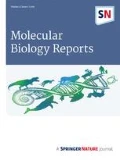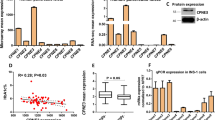Abstract
Several studies have recently reported strong association between type 2 diabetes and variation in the transcription factor 7-like 2 (TCF7L2) gene, which has been confirmed by several other genome-wide studies. However, the physiological implications of this transcription factor on the pathogenesis of type 2 diabetes is not yet known. The aim of this study was to investigate the alteration in TCF7L2 gene expression in human pancreatic cell line in response to various factors in vitro. MIA Paca-2 cell line (Human Pancreas cell line) was cultured in the presence of curcumin, lipopolysaccaride and glucose (low and high concentration). TCF7L2 gene expression was determined using quantitative real-time RT-PCR. Treatment with curcumin significantly increased TCF7L2 gene expression to 3.24 fold (1.7-log fold) (P = 0.003) compared to the controls while treatment with LPS decreased TCF7L2 gene expression to 0.88-fold (−0.18-log). On the other hand, glucose increased TCF7L2 gene expression in pancreatic cell line. Our data suggest a role for TCF7L2 in glucose homeostasis. The contrary effect of curcumin and LPS on expression of TCF7L2 in pancreatic cells supports a role for TCF7L2 in their survival and function in inflammatory conditions.


Similar content being viewed by others
References
Smith U (2007) TCF7L2 and type 2 diabetes-we WNT to know. Diabetologia 50:6–7
Cauchi S, Meyre D, Dina C, Choquet H, Samson C, Gallina S et al (2006) Transcription factor TCF7L2 genetic study in the French population: expression in human ß-cells and adipose tissue and strong association with type 2 diabetes. Diabetes 55:2903–2908. doi:10.2337/db06-0474
Yi F, Brubaker PL, Jin T (2005) TCF-4 mediates cell type-specific regulation of proglucagon gene expression by beta-catenin and glycogen synthase kinase-3beta. J Biol Chem 280:1457–1464. doi:10.1074/jbc.M411487200
Cauchi S, Meyre D, Choquet H, Dina C, Born C, Marre M et al (2006) TCF7L2 variation predicts hyperglycemia incidence in a French general population: the data from an epidemiological study on the Insulin Resistance Syndrome (DESIR) study. Diabetes 55:3189–3192. doi:10.2337/db06-0692
Grant SF, Thorleifsson G, Reynisdottir I, Benediktsson R, Manolescu A, Sainz J et al (2006) Variant of transcription factor 7-like 2 (TCF7L2) gene confers risk of type 2 diabetes. Nat Genet 38:320–323. doi:10.1038/ng1732
Shu L, Sauter NS, Schulthess FT, Matveyenko AV, Oberholzer J, Maedler K (2008) Transcription factor 7-like 2 regulates beta-cell survival and function in human pancreatic islets. Diabetes 57:645–653. doi:10.2337/db07-0847
Freathy RM, Weedon MN, Bennett A, Hypponen E, Relton CL, Knight B et al (2007) Type 2 diabetes TCF7L2 risk genotypes alter birth weight a study of 24, 053 individuals. Am J Hum Genet 80:1150–1161. doi:10.1086/518517
Groves CJ, Zeggini E, Minton J, Frayling TM, Weedon MN, Rayner NW et al (2006) Association analysis of 6,736 UK subjects provides replication and confirms TGF7L2 as a type 2 diabetes susceptibility gene with a substantial effect on individual risk. Diabetes 55:2640–2644. doi:10.2337/db06-0355
Florez JC, Jablonski KA, Bayley N, Pollin TL, de Bakker PI, Shuldiner AR, Knowler WC, Nathan DM, Altshuler D (2006) TCF7L2 polymorphisms and progression to diabetes in the Diabetes Prevention Program. N Engl J Med 355:241–250. doi:10.1056/NEJMoa062418
Saxena R, Gianniny L, Burtt NP, Lyssenko V, Giuducci C, Sjogren M et al (2006) Common single nucleotide polymorphisms in TCF7L2 are reproducibly associated with type 2 diabetes and reduce the insulin response to glucose in nondiabetic individuals. Diabetes 55:2890–2895. doi:10.2337/db06-0381
Zhang C, Qi L, Hunter DJ, Meigs JB, Manson JE, van Dam RM, Hu FB (2006) Variant of transcription factor 7-like 2 (TCF7L2) gene and the risk of type 2 diabetes in large cohorts of US women and men. Diabetes 55:2645–2648. doi:10.2337/db06-0643
Scott LJ, Mohlke KL, Bonnycastle LL, Wilier CJ, Li Y, Duren WL, Eraos MR et al (2007) A genome-wide association study of type 2 diabetes in Finns detects multiple susceptibility variants. Science 316:1341–1345. doi:10.1126/science.1142382
Lyssenko V, Lupi R, Marchetti P, Del Guerra S, Orho-Melander M, Almgren P et al (2007) Mechanisms by which common variants in the TCF7L2 gene increase risk of type 2 diabetes. J Clin Invest 117:2155–2163. doi:10.1172/JCI30706
Florez JC (2007) The new type 2 diabetes gene TCF7L2. Curr Opin Clin Nutr Metab Care 10:391–396. doi:10.1097/MCO.0b013e3281e2c9be
Robertson RP (1989) Type Ð diabetes, glucose “non-sense”, and islet desensitization. Diabetes 38:1501–1505. doi:10.2337/diabetes.38.12.1501
Butler AE, Janson J, Bonner-Weir S, Ritzel R, Rizza RA, Butler PC (2003) B-CeIl deficit and increased beta-cell apoptosis in humans with type 2 diabetes. Diabetes 52:102–110. doi:10.2337/diabetes.52.1.102
Loos RJ, Franks PW, Francis RW, Barroso I, Gribble FM, Savage DB et al (2007) TCF7L2 polymorphisms modulate proinsulin levels and {beta}-cell function in a British Europid population. Diabetes 56:1943–1947. doi:10.2337/db07-0055
Damcott CM, Pollin TI, Reinhart LJ, Ott SH, Shen H, Silver KD, Mitchell BD, Shuldiner AR (2006) Polymorphisms in the transcription factor 7-like 2 (TCF7L2) gene are associated with type 2 diabetes in the Amish: replication and evidence for a role in both insulin secretion and insulin resistance. Diabetes 55:2654–2659. doi:10.2337/db06-0338
Chandak GR, Janipalli CS, Bhaskar S, Kulkarni SR, Mohankrishna P, Hattersley AT et al (2007) Common variants in the TCF7L2 gene are strongly associated with type 2 diabetes mellitus in the Indian population. Diabetologia 50:63–67. doi:10.1007/s00125-006-0502-2
Rees SD, Bellary S, Britten AC, O’Hare JP, Kumar S, Barnett AH et al (2008) Common variants of the TCF7L2 gene are associated with increased risk of type 2 diabetes mellitus in a UK-resident South Asian population. BMC Med Genet 21:8. doi:10.1186/1471-2350-9-8
Amoli MM, Mousavizadeh R, Sorouri R, Rahmani M, Larijani B (2006) Curcumin inhibits in vitro MCP-1 release from mouse pancreatic islets. Transplant Proc 38:3035–3038. doi:10.1016/j.transproceed.2006.08.172
Dorai T, Aggarwal BB (2004) Role of chemopreventive agents in cancer therapy. Cancer Lett 215:129. doi:10.1016/j.canlet.2004.07.013
Singh S, Aggarwal BB (1995) Activation of transcription factor NF-kappa B is suppressed by curcumin (diferuloylmethane). J Biol Chem 270:24995. doi:10.1074/jbc.270.25.14867
Author information
Authors and Affiliations
Corresponding author
Rights and permissions
About this article
Cite this article
Khalooghi, K., Hashemi, S., Mehraban, N. et al. In vitro modulation of TCF7L2 gene expression in human pancreatic cells. Mol Biol Rep 36, 2329–2332 (2009). https://doi.org/10.1007/s11033-009-9452-3
Received:
Accepted:
Published:
Issue Date:
DOI: https://doi.org/10.1007/s11033-009-9452-3




